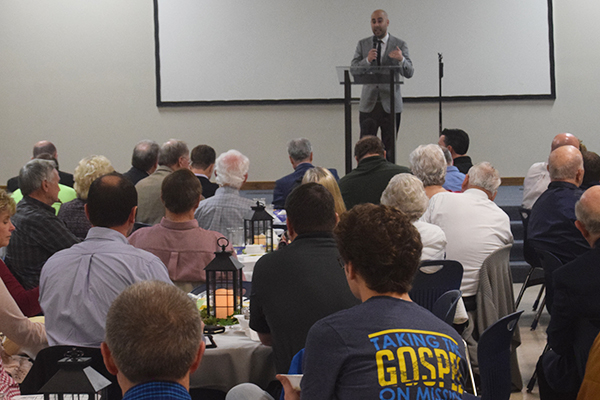By Grace Thornton
The Alabama Baptist
About 75 million people between the ages of 18–38 are living their lives in America today, and often the church isn’t sure what to do with them, said Nick Floyd, lead teaching pastor of Cross Church, Fayetteville, Arkansas.
“Millennials have now surpassed the Boomer generation,” said Floyd, himself a millennial at 34. “They’re here to stay, and they’re here to reach. It’s an evangelism issue for the church.”
During a “Reaching Millennials” banquet Jan. 22 to kick off the State Evangelism Conference, Floyd offered three things churches should know about the millennial generation:
1. They don’t always view commitment the way that you do.
There’s no brand loyalty, Floyd said. A 35-year-old millennial might have had four jobs already, and that’s not a bad thing necessarily — it’s just different from previous generations.
But it has implications for churches, he said.
“Just because they grew up in your church doesn’t mean they will come back there (if they move back to town) or stay there, and just because they were raised Southern Baptist doesn’t mean they will stay Southern Baptist,” Floyd said.
“Millennials will not come to your church or stay in your church if they don’t feel you have a mission worth following. If it’s just church as usual, they’re out.”
But if you are out there caring about your community and being the hands and feet of Christ, “they will go to the ends of the earth for that kind of mission,” he said.
2. They have grown up with technology.
Because of that, it’s second nature to them, Floyd said.
“They’re not impressed with what we can do as a church,” he said. It makes it hard to bring in a guest speaker or singer or hold an event, because they can pull up online in 10 seconds something that will be better than we can do in our church.”
But even though they may be very connected electronically, they are lonely personally, he said.
3. They want the truth.
“The millennials I preach to want the hard message of the Bible,” Floyd said. “It’s almost the opposite of what you would expect.”
They often come to the church broken and have come to the end of what the world has to offer and say, “Is there more to this?” They want to know what God has to say — they don’t want the fluff, Floyd said. They want a way out of their shame and their sin.
What the church can do
With those three things in mind, Floyd offered three things the church can do to reach millennials:
1. We can offer relationships.
Millennials may be lonely, but the church can offer real connections, Floyd said.
“I would encourage you to provide what technology cannot,” he said. “We have the opportunity to provide real, lasting friendship and community whereby we can share the gospel and they can find Christ.”
Many millennials come from broken homes and have father issues or mother issues, he said. “They are longing for relationships. What a great opportunity for us to be the Church.”
For example, one couple in Floyd’s church in their 60s is “not flashy” or trendy, but they “love the mess out of our college students, and these kids love them,” he said.
2. We can call them to commitment.
Growing up in broken homes, many of them don’t know how to take simple steps of commitment, Floyd said. For instance, many delay getting married to the person right in front of them because they are afraid they might miss the next person, who might be better.
“I told a group of them recently, ‘There are two things you need to look for in a husband — does he love Jesus and does he have a job. This is healthy, this is normal — make a commitment to that person,’” Floyd said.
3. We can give them the truth of God’s Word.
They want the truth, and the church has it, Floyd said.
“They want the Word of God, and they will consume it. They will love it,” he said.
But on controversial topics, though they may agree with you on the topic, they may not agree with the tone in which you speak, Floyd said.
Speaking with compassion
“The millennials are firm in convictions but they want firmness in kindness too, so I would encourage us gently together to watch our tone,” he said. “It doesn’t mean you’re compromising. It doesn’t mean you’re changing the Word of God. It just means they want to experience the compassion of Jesus while we’re talking about the difficult things that Jesus said.”






Share with others: